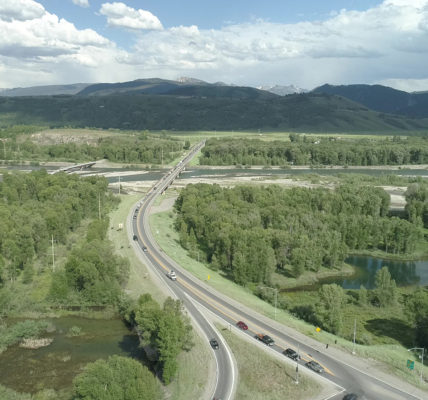By Joel Funk
Wyoming Tribune Eagle
Via Wyoming News Exchange
CHEYENNE — Months of speculation officially ended last week when Wyoming Treasurer Mark Gordon, a Republican, declared he intends to be the state’s next governor.
Gordon kicked off a state tour Wednesday to announce his candidacy in his hometown of Buffalo and continued with stops Thursday in Cheyenne and Casper. While he stated he intended to run in February, Gordon tried to hold off on his official announcement until the Wyoming Legislature wrapped up its 2018 budget session.
At the Cheyenne Frontier Days Old West Museum on Thursday afternoon, Gordon told supporters, “I’m not going to be afraid to make tough decisions, and I’m always going to finish what I start.”

“I’ll go into office knowing some things just are not for sale, whether it’s our conservative values, your tax dollars or our financial freedom. That’s why I’m running for governor of Wyoming,” Gordon said.
Gordon was appointed to serve as Wyoming’s treasurer in 2012 after the death of Joseph Meyer. Two years later, he was elected to the position.
Now he seeks to be the replacement for Republican Gov. Matt Mead. It’s starting to look like a crowded field on the Republican side, as Gordon is the fifth candidate to announce a campaign.
Of those candidates, Gordon is the only one with experience in elected public office. That, he said, is one of the reasons he is qualified to take on the job as the state’s top executive.
“What distinguishes me is the fact you can look at my record, see what I’ve done in the treasurer’s office, and it speaks for itself,” Gordon said in an interview Wednesday. “Everything I’ve promised to do, I’ve gotten done. I’m not trying to pat my own back, but I think the state is better off for the work we’ve done, and I think that speaks to what I will be able to do as governor.”
The State Treasurer’s Office manages just more than $20 billion in non-pension investable funds across seven fund types. It has touted its performance during Gordon’s tenure, with the state’s fund exceeding its benchmark in its best performance through one-, three-, five- and 10-year periods during fiscal year 2017.
Gordon also points to his legislative and electoral victory in pushing through a constitutional amendment that allows the treasurer to invest more types of funds in the stock market.
The race for governor comes amid a lingering economic downturn in Wyoming that followed a downturn in the state’s breadbasket fossil fuels sector. As most economists and leadership in elected offices – including Mead and Senate President Eli Bebout, R-Riverton – don’t expect another mineral boom to save the state’s economy anytime soon, it has spurred a conversation about how to cope with the difficult circumstances.
Gordon said he sees the situation as a combination of challenges and opportunities. He points to a similar set of circumstances in the 1980s, where many didn’t know what the future held in Wyoming. As happened then, Gordon said he’s optimistic the state would find innovative ways to recover. While he doesn’t know what the path to recovery is now, Gordon expects Wyoming would get itself back on its feet under his conservative direction.
“I think, all in all, this may not be the kind of boom we’ve seen before, but I think there’s going to be steady growth and opportunity,” he said. “But I do think our government is going to have to rein back some of its ambition and build a more measured approach to the projects we’ve got.”
The Wyoming Legislature had a difficult 2018 budget session, where lawmakers found themselves at an impasse in philosophical approach to solving the state’s fiscal woes. The House wanted to divert savings and use investment income to support K-12 education expenses in the long term, while the Senate dismissed the approach, preferring to make significant reductions to government services in the long term.
Looking at the Legislature’s dilemma, Gordon said he thinks Wyoming does need to prioritize in areas such as state-funded capital construction. When it comes to K-12 funding, Gordon, a former Johnson County School board member, said the state “needs to live within its means.” Having that conversation, he said, needs to start at the local level before any decisions are made from the top.
Mead hopes one of his legacies from his time in office will be ENDOW (Economically Needed Diversity Options for Wyoming), his plan to diversify the state’s economy through the next two decades. That initiative kicked off in 2017 and saw legislative success in 2018, securing funding and implementing policies based on the ENDOW Executive Council’s recommendations. But the success of ENDOW, Mead said, is dependent on future administrations continuing to carry the torch.
Gordon said ENDOW is one way of moving a “critical” discussion forward on economic diversification. But he said his focus would be on setting up a business-friendly environment in Wyoming.
“I think there are going to be new businesses that show up, and I think the economy will start to expand,” Gordon said. “I think we’ll do so because we don’t have regulatory burdens, and the next governor is going to have to make sure we don’t expand regulation and we push back against federal overreach.”
It remains unclear whether other speculative Republican candidates – including Cheyenne businessman Sam Galeotos, House Speaker Steve Harshman of Casper and Wyoming Department of Health Director Tom Forslund of Cheyenne – will enter the governor’s race. Gordon is arguably more moderate than at least three of the other five candidates who have expressed views of a libertarian variety.
Only former House Minority Leader Mary Throne of Cheyenne has declared candidacy on the Democratic side. While Wyoming is an overwhelmingly conservative state, three of the last five governors were Democrats.




